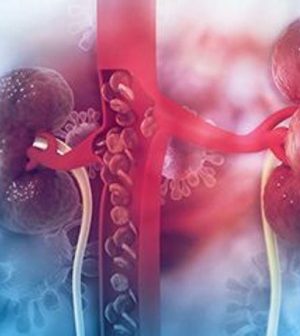- Could Artificial Sweeteners Be Aging the Brain Faster?
- Techniques for Soothing Your Nervous System
- Does the Water in Your House Smell Funny? Here’s Why
- Can a Daily Dose of Apple Cider Vinegar Actually Aid Weight Loss?
- 6 Health Beverages That Can Actually Spike Your Blood Sugar
- Treatment Options for Social Anxiety Disorder
- Understanding the Connection Between Anxiety and Depression
- How Daily Prunes Can Influence Cholesterol and Inflammation
- When to Take B12 for Better Absorption and Energy
- Epsom Salts: Health Benefits and Uses
Scientists Report ‘Rogue Antibodies’ Behind Severe Clotting With COVID

“Rogue antibodies” that seem to trigger severe blood clotting and illness in COVID-19 patients have been identified by scientists.
Their analysis of blood samples from 244 patients hospitalized for COVID-19 revealed circulating antiphospholipid antibodies, which are autoantibodies that target a person’s own organs and systems.
These autoantibodies are more common in people with autoimmune disorders, such as lupus, but can be activated in response to viral infections and also activate other immune responses, according to the study authors.
The report was published Feb. 17 in the journal Arthritis & Rheumatology.
Specifically, the investigators found that blood samples from the COVID-19 patients had higher levels of the antibody IgG than people without COVID-19. IgG works with other immune cells, such as IgM, to respond to immune threats. Higher levels of IgG were associated with greater COVID-19 disease severity, such as requiring breathing assistance.
When the researchers removed IgG from the COVID-19 patients’ blood samples, there was a decline in molecular indicators of “blood vessel stickiness.” When IgG antibodies were added to blood samples from people without COVID-19, there was an increase in the blood vessel inflammatory response that can lead to clotting.
Since all organs have blood vessels in them, higher levels of IgG that can increase the “stickiness” of blood vessels in COVID-19 patients may help explain why the virus can damage so many organs, including the heart, lungs and brain, study co-corresponding author Dr. Yogen Kanthi, a cardiologist who leads the Laboratory of Vascular Thrombosis and Inflammation at the U.S. National Heart, Lung, and Blood Institute, said in a U.S. National Institutes of Health news release. Kanthi is also an assistant professor of cardiovascular medicine at the University of Michigan, Ann Arbor.
The researchers observed similar patterns after analyzing blood samples from 100 patients hospitalized for sepsis, which can leave the body in inflammatory shock following a bacterial or viral infection.
The study authors suggested that future research could assess the potential benefits of screening COVID-19 patients for antiphospholipids and other autoantibodies, and doing so at earlier stages of infection. This may help identify patients at risk for severe blood clotting, vascular inflammation and respiratory failure.
Other studies could assess the potential benefits of giving these patients treatments to protect their blood vessels or fine-tune their immune system, Kanthi and colleagues noted.
More information
Visit Weill Cornell Medicine for more on severe COVID and clotting.
SOURCE: U.S. National Institutes of Health, news release, Feb. 17, 2022
Source: HealthDay
Copyright © 2026 HealthDay. All rights reserved.










